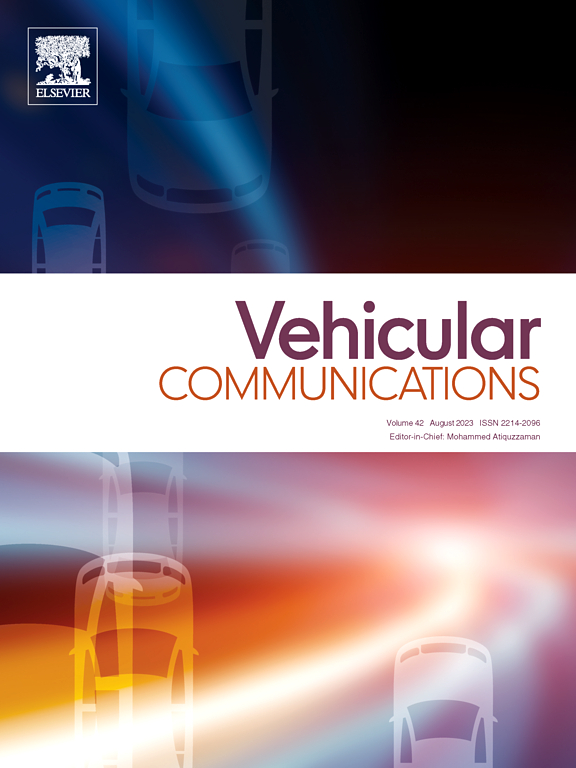Privacy-aware revocation in VANETs with a Blockchain using accumulator
IF 6.5
2区 计算机科学
Q1 TELECOMMUNICATIONS
引用次数: 0
Abstract
In recent years, Vehicular Ad-hoc Networks (VANETs) have gained widespread acceptance to enable vehicles to communicate and exchange critical information, such as road conditions, traffic congestion, speed, and vehicle locations. Nonetheless, the wireless nature of VANET communication renders it susceptible to various security attacks. To counter these vulnerabilities, privacy-preserving authentication schemes play a crucial role. Many of these schemes rely on Public Key Infrastructure (PKI) to mitigate security risks, ensuring authentication and message integrity through public key certificates. However, a significant drawback of these schemes arises from utilizing the Certificate Revocation List (CRL), which introduces notable delays. In addition, vehicular networks are time-sensitive, and prolonged delays may lead to severe consequences. Moreover, CRL checking can inadvertently leak sensitive vehicle information, making PKI-based schemes impractical for VANETs. To address these challenges, we propose a privacy-preserving revocation mechanism based on a zero-knowledge accumulator, tailored specifically for VANETs. This mechanism significantly reduces the time spent checking revoked certificates while preserving user privacy. Furthermore, by utilizing Blockchain technology to publish revoked certificates in a distributed manner, we can reduce the time required for distribution, decrease network congestion, improve efficiency, and eliminate reliance on a single central authority. Additionally, our approach aims to overcome the issue of non-membership witness updates in batch mode. Our proposed privacy-aware scheme has been rigorously evaluated using the automatic verification tool ProVerif. The results confirm that our solution guarantees the desired properties of anonymity and unlinkability. Through extensive simulation and performance analysis, we demonstrate that our scheme is not only privacy-preserving but also an efficient and practical solution for real-world deployment in VANETs.
使用accumulator的b区块链的vanet中的隐私感知撤销
近年来,车辆自组织网络(vanet)已获得广泛接受,使车辆能够通信和交换关键信息,如道路状况、交通拥堵、速度和车辆位置。尽管如此,VANET通信的无线特性使其容易受到各种安全攻击。为了对抗这些漏洞,保护隐私的身份验证方案起着至关重要的作用。这些方案中的许多都依赖于公钥基础设施(PKI)来降低安全风险,通过公钥证书确保身份验证和消息完整性。然而,这些方案的一个重大缺点是使用证书撤销列表(CRL),这会带来明显的延迟。此外,车辆网络是时间敏感的,长时间的延误可能导致严重的后果。此外,CRL检查可能无意中泄露敏感的车辆信息,使得基于pki的方案对VANETs不切实际。为了解决这些挑战,我们提出了一种基于零知识累加器的隐私保护撤销机制,专门为VANETs量身定制。这种机制大大减少了检查已撤销证书所花费的时间,同时保护了用户隐私。此外,通过利用区块链技术以分布式方式发布已撤销的证书,我们可以减少分发所需的时间,减少网络拥塞,提高效率,并消除对单个中央权威机构的依赖。此外,我们的方法旨在克服批量模式下非成员见证更新的问题。我们提出的隐私感知方案已经使用自动验证工具ProVerif进行了严格的评估。结果证实,我们的方案保证了期望的匿名性和不可链接性。通过广泛的仿真和性能分析,我们证明了我们的方案不仅是隐私保护的,而且是一种高效实用的解决方案,适用于在VANETs中实际部署。
本文章由计算机程序翻译,如有差异,请以英文原文为准。
求助全文
约1分钟内获得全文
求助全文
来源期刊

Vehicular Communications
Engineering-Electrical and Electronic Engineering
CiteScore
12.70
自引率
10.40%
发文量
88
审稿时长
62 days
期刊介绍:
Vehicular communications is a growing area of communications between vehicles and including roadside communication infrastructure. Advances in wireless communications are making possible sharing of information through real time communications between vehicles and infrastructure. This has led to applications to increase safety of vehicles and communication between passengers and the Internet. Standardization efforts on vehicular communication are also underway to make vehicular transportation safer, greener and easier.
The aim of the journal is to publish high quality peer–reviewed papers in the area of vehicular communications. The scope encompasses all types of communications involving vehicles, including vehicle–to–vehicle and vehicle–to–infrastructure. The scope includes (but not limited to) the following topics related to vehicular communications:
Vehicle to vehicle and vehicle to infrastructure communications
Channel modelling, modulating and coding
Congestion Control and scalability issues
Protocol design, testing and verification
Routing in vehicular networks
Security issues and countermeasures
Deployment and field testing
Reducing energy consumption and enhancing safety of vehicles
Wireless in–car networks
Data collection and dissemination methods
Mobility and handover issues
Safety and driver assistance applications
UAV
Underwater communications
Autonomous cooperative driving
Social networks
Internet of vehicles
Standardization of protocols.
 求助内容:
求助内容: 应助结果提醒方式:
应助结果提醒方式:


